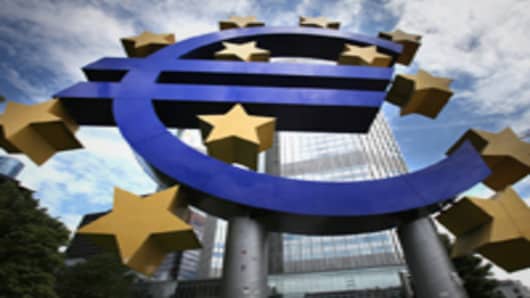The markets have been starved of euro zone news for several weeks, but as politicians and traders return to their desks over the next couple of weeks, the crisis is set to return to the fore again.
August has so far been dominated by the Olympics, with little news from the single currency area that the merest eyebrow-raise from European Central Bank (ECB)(explain this)President Mario Draghi has moved markets. With weak trading volumes, every interview with a euro zone policymaker is pored over and has the potential to send markets up or down.
“With the people who normally stir the pot on the euro crisis off on holiday, there are fewer uncertainties on a daily basis about what will happen next and when,” Carl Weinberg, chief economist at High Frequency Economics, wrote in a research note. “Despite a month of remission, Euroland’s financial sector vulnerabilities remain unaddressed.”
Greece, for months the focal point for worries about the euro zone, has returned to the agenda, with recently anointed Prime Minister Antonis Samaras on a tour to meet euro zone leaders, including German Chancellor Angela Merkel and French President Francois Hollande, later in the week. He is expected to plead for a two-year extension to the deadline for the embattled Mediterranean country to meet its budget requirements.
Yet larger and potentially more damaging euro zone peripheral economy(explain this) Spain will not stay out of the spotlight for long, as markets wait for the country to seek a bailout from the ECB.
“The ECB is playing this delicate balancing act. They know they cannot let Spain collapse, but they know they need to get them to agree to this conditionality. The two sides are just playing a game of chicken between one another,” Giles Keating, head of research at Credit Suisse, told CNBC Europe’s “Squawk Box” Monday. “The more likely central scenario is that the negotiations that are going on will result in some kind of deal. It will mean they (Spain) sign up to the terms of what they are doing at the moment and in return the ECB starts to intervene.”
Bond yields (explain this)for peripheral euro zone countries and European banking stockshave bounced off their lows over the last couple of weeks amid hopes for more action from the ECB. Earnings for the second quarter were disappointing in the euro zone, but stock markets are still slightly up this month.
Weinberg believes that yields on German Bundscannot fall any further, and that investors will eventually be locked in a classic Keynesian “liquidity trap.” In a “liquidity trap,” when the expected returns from investments in securities — such as Bunds — are too low, investment falls, recession(explain this) begins, and investors start holding more cash.
Weinberg warned that the current sell-off in Bunds looked “potentially ominous” if it does not reverse when European traders return to their desks on Sept. 3.
—By CNBC’s Catherine Boyle. Follow Her on Twitter @catboyle01




